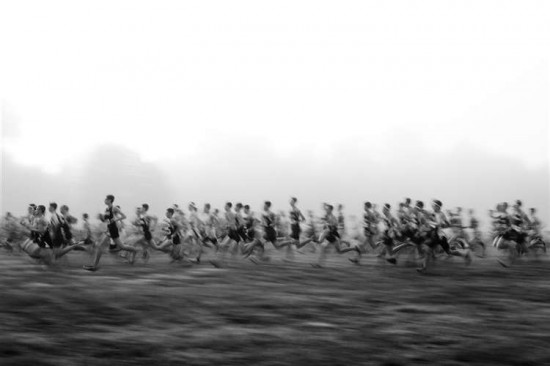
Great flash fiction works the same way as a finely-honed razor: it’s quick, precise and often, cuts deep. A tightly-written piece uses its economy to convey tone, voice, and also to capture a scene that is worth re-examining for its nuances. Seventeen-year-old Peter LaBerge uses this form to his advantage in Again, which earned a Silver Medal in the 2012 Scholastic Art & Writing Awards. Like a roller-coaster ride, it may make you both breathless while you read it and wanting immediately to return to its first word. Check it out!
She knew he was going back to fight again. She found the confirmation slip from the army this morning, under his coffee mug. She also knew he was hiding it from her. There was a smidge of coffee across the top, which had dried by the time she found it. It resembled blood.
She pulls the shrimp through her teeth and tosses the shell into the white ceramic bowl, butter rolling down her wrist, which is caked with lemon and salt.
“Do you want a bite?” He holds out a spoonful of his chowder and inches it towards her across the table.
“No, thanks, I like this.”
“C’mon, have some. They did it just right.” He leans closer, and the spoon almost touches her lips.
“I said I’m fine.”
He takes the spoonful for himself.
“So. How was your day?”
“I already told you it was fine.” She plucks another shrimp from its shell with her teeth and tosses the shell again. “Dandy, in fact.”
“You don’t have to be sarcastic. I’m only asking because I’m interested.” He pauses. “Would you like some water?”
She shakes her head.
He grins, his glass clinking against the wood of the table when he puts it down. Her anger starts to melt.
“I was so worried.”
She finishes her shrimp quickly, barely leaving time to chew, while he drags the tip of his spoon across his chowder, making craters and mountains in the surface.
Finally: “Did I do something wrong?”
She lets that question linger. Finally, she sucks the last shrimp shell dry. “When were you going to tell me you’re going back?”
She remembers how many times they’ve come to this seaside grille. There are barely any waves in Maryland, but they’ve always liked the beach anyways. They used to run barefoot into the bar, up the stairs, and to the roof together. They used to listen to the ocean sing and crash against the sand. She wants to go back there now.
“I’m sorry.” His eyes wilt and shut like dried tulips. “I don’t want to go back. But Miller got his arm blown off, and Webster got shot. I have to go fight.”
“No. No, you don’t have to go anywhere.” She looks away, to the ocean outside the grille. The waves still float and sink back, but they don’t sing anymore.
She remembers the time her feet pounded across the sand and to the concrete behind his—she remembers her toes tucked underneath the roof shingles, and his hand locked in hers so she wouldn’t fall. She remembers how simplistic, and happy, they were with each other. That, of course, was before he left the first time.
“I just have to.”
“But you just got home! You know how hard it was last time. If you loved me, you wouldn’t go back.” She curls her toes under the table, and closes her eyes. She remembers the ocean and their footprints, together, soggy with sand.
“You can’t understand. It’s not a choice anymore. When you lose your brothers one at a time, you can’t just sit back and watch. How do you think I feel when I get phone calls saying Calvin’s dead, or Eli’s lost a leg? I have to do something!” She jolts from the harsh tone of voice; her eyes won’t budge. She pretends the grille’s carpet is the shingled roof, and grinds her toes into it underneath the table. She wants that moment back. She wants his laughter, and his smile. She wants the war gone. She wants her husband home.
But his fingers fold into fists and slam against the table. A crock of sea salt tips, spraying like sand during a hurricane. She stares at the cascade of salt pouring from the table. Her eyes swim in tears like flickering flames. Her chair squeaks against the floor. She doesn’t care about the salt, or the war, or even him. She pushes herself back, the chair legs shrieking against the china floor tiles like a scalpel on skin.
She walks, barefoot and alone, up the grille’s stairs, through the bar, and to the roof. But he doesn’t follow.
***
Apply to the Scholastic Art & Writing Awards Flash Fiction Category!
In Brief: Flash Fiction is a highly-focused story characterized by its brevity. This short form of storytelling is narrative in style but must not exceed 1,300 words. As with all categories, there are no limitations on subject matter, theme or language in submitted work. Jurors look for originality, technical skill, and the emergence of a personal voice. Students can submit their work to the 2013 Scholastic Art & Writing Awards beginning September 17, 2012. To learn how to submit, visit: http://www.artandwriting.org/Awards/HowTo
